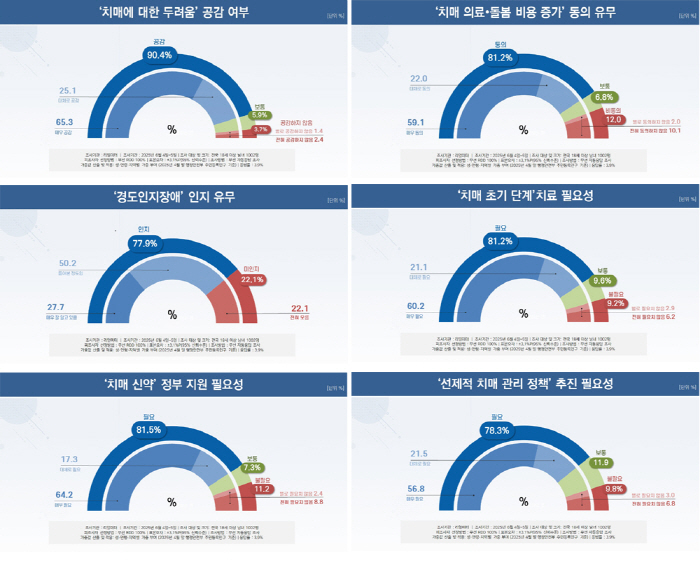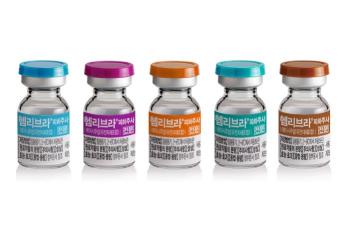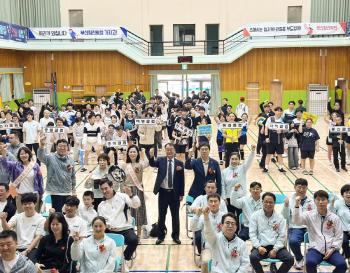90% of the people feel fear of dementia...New Government Needs Preemptive Dementia Care Policy
Jun 16, 2025
Amid the super-aged society, nine out of 10 Koreans showed high sympathy for the burden and fear of dementia, and said it is necessary for the new government to pursue active policies for early treatment of dementia to slow the deterioration of severe dementia.
The Korean Dementia Association (Chairman Choi Sung-hye) announced on the 16th the results of a poll of 1,002 men and women aged 18 or older nationwide with Realmeter, a polling agency. The survey was conducted to understand the people's perception of dementia and their expectations for government policies in the wake of the establishment of national tasks following the launch of the new government and the establishment of the 5th Comprehensive Dementia Management Plan (2026-2030).
The survey was conducted on June 4 (Wednesday) and 5 (Thursday) for two days after the presidential election, using Radio (100%) Random Dialing (RDD) Automatic Response Survey (ARS) through random sampling frames. The final 1002 people responded, and the sample error is ±3.1 percentage points to the 95% confidence level.
◇ Increase social costs due to dementia
As a result of the survey, it was confirmed that about 90.4% of the respondents sympathized with the fear and burden of dementia. By age, those in their 40s and 60s were the highest at 94.9% and 94.0%, respectively.
Meanwhile, as Korea enters a super-aged society, social medical and care costs due to severe dementia are increasingIt was found that 81.2% of the respondents agreed that '. Age-specific trends were likewise higher in the 40s and 60s.
In fact, according to the Health Insurance Review and Assessment Service's 2024 statistics on frequent diseases, the disease with the highest health insurance medical expenses from inpatient treatment last year was Alzheimer's dementia, which cost 1.8694 trillion won. In addition, about half of families with dementia patients cited the economic burden of caring as the biggest difficulty.
◇ Pre-dementia stage 'Mild cognitive impairment', consensus on the need for early intervention in treatment and management
On the other hand, despite the high fear of dementia, only 27.7% of respondents answered that they were "well aware" of 'Alzheimer's dementia', which accounts for most of the dementia.
However, 77.9% of the recognition of the term 'mild cognitive impairment' itself was confirmed, which is interpreted as gradually spreading social awareness and understanding of the term compared to the percentage (41.3%) who answered 'I've heard of it' in the same survey three years ago. In addition, this question showed a difference in response by age, with 40.2% of those aged 18 to 29 saying they didn't know at all, while those in their 50s and older, who are in the prevalence of dementia and supporting generation, said they knew very well (34%).
Mild cognitive impairment is a high-risk group for dementia with cognitive impairment, which is a partial symptom of dementia, and 10-15% of patients with mild cognitive impairment progress to dementia every year compared to 1%-2% of normal people. Mild cognitive impairment was confirmed to be a test for cognitive decline such as memory, but most independent daily life is possible, and treatment intervention at this time is known as an important time to slow or prevent the deterioration of severe dementia.
81.2% of survey respondents agreed on the need for treatment to prevent it from worsening to severe in the early stages, such as mild cognitive impairment, and 85.5% of respondents with dementia patients among family members and acquaintances agreed on the need for treatment in the early stages, showing relatively high empathy compared to those without dementia patients (77.9%). In addition, 81.5% of the respondents answered that active support is needed for the treatment of new dementia drugs, such as applying health insurance at the government level.
In addition, some differences in perception of the necessity of applying health insurance for new dementia drugs were also revealed according to the consensus on the increase in medical and care costs due to the rapid increase in dementia patients. Of the respondents who sympathized with the social burden problem, 83.7% agreed on the need to apply health insurance for new dementia drugs, while 75.1% agreed, which was relatively low.
◇Demand the new government for an 'active and preemptive dementia management policy'
In addition to , 78.3% of the respondents agreed with the goal of reducing public pain and care costs caused by severe dementia, and the new government, which was launched this time, should promote a more preemptive dementia management policy focusing on supporting early-stage diagnostic tests and new drug treatment such as mild cognitive impairment.
Choi Sung-hye, Chairman of the Korean Dementia Association (Inha University Hospital Neurology), said "The Korean Dementia Association has continued various discussions on dementia policies with the Ministry of Health and Welfare and the National Assembly over the past few yearsBased on the various policy suggestions discussed socially, we hope that the new government's national task and the 5th Comprehensive Dementia Management Plan will significantly change the dementia policy paradigm and contain practical policies that people can experience in their lives. The society will also actively cooperate in the process of preparing this,' he said.
The Korean Dementia Association (Chairman Choi Sung-hye) announced on the 16th the results of a poll of 1,002 men and women aged 18 or older nationwide with Realmeter, a polling agency. The survey was conducted to understand the people's perception of dementia and their expectations for government policies in the wake of the establishment of national tasks following the launch of the new government and the establishment of the 5th Comprehensive Dementia Management Plan (2026-2030).
The survey was conducted on June 4 (Wednesday) and 5 (Thursday) for two days after the presidential election, using Radio (100%) Random Dialing (RDD) Automatic Response Survey (ARS) through random sampling frames. The final 1002 people responded, and the sample error is ±3.1 percentage points to the 95% confidence level.
◇ Increase social costs due to dementia
As a result of the survey, it was confirmed that about 90.4% of the respondents sympathized with the fear and burden of dementia. By age, those in their 40s and 60s were the highest at 94.9% and 94.0%, respectively.
Meanwhile, as Korea enters a super-aged society, social medical and care costs due to severe dementia are increasingIt was found that 81.2% of the respondents agreed that '. Age-specific trends were likewise higher in the 40s and 60s.
In fact, according to the Health Insurance Review and Assessment Service's 2024 statistics on frequent diseases, the disease with the highest health insurance medical expenses from inpatient treatment last year was Alzheimer's dementia, which cost 1.8694 trillion won. In addition, about half of families with dementia patients cited the economic burden of caring as the biggest difficulty.
◇ Pre-dementia stage 'Mild cognitive impairment', consensus on the need for early intervention in treatment and management
On the other hand, despite the high fear of dementia, only 27.7% of respondents answered that they were "well aware" of 'Alzheimer's dementia', which accounts for most of the dementia.
However, 77.9% of the recognition of the term 'mild cognitive impairment' itself was confirmed, which is interpreted as gradually spreading social awareness and understanding of the term compared to the percentage (41.3%) who answered 'I've heard of it' in the same survey three years ago. In addition, this question showed a difference in response by age, with 40.2% of those aged 18 to 29 saying they didn't know at all, while those in their 50s and older, who are in the prevalence of dementia and supporting generation, said they knew very well (34%).
Mild cognitive impairment is a high-risk group for dementia with cognitive impairment, which is a partial symptom of dementia, and 10-15% of patients with mild cognitive impairment progress to dementia every year compared to 1%-2% of normal people. Mild cognitive impairment was confirmed to be a test for cognitive decline such as memory, but most independent daily life is possible, and treatment intervention at this time is known as an important time to slow or prevent the deterioration of severe dementia.
81.2% of survey respondents agreed on the need for treatment to prevent it from worsening to severe in the early stages, such as mild cognitive impairment, and 85.5% of respondents with dementia patients among family members and acquaintances agreed on the need for treatment in the early stages, showing relatively high empathy compared to those without dementia patients (77.9%). In addition, 81.5% of the respondents answered that active support is needed for the treatment of new dementia drugs, such as applying health insurance at the government level.
In addition, some differences in perception of the necessity of applying health insurance for new dementia drugs were also revealed according to the consensus on the increase in medical and care costs due to the rapid increase in dementia patients. Of the respondents who sympathized with the social burden problem, 83.7% agreed on the need to apply health insurance for new dementia drugs, while 75.1% agreed, which was relatively low.
◇Demand the new government for an 'active and preemptive dementia management policy'
In addition to , 78.3% of the respondents agreed with the goal of reducing public pain and care costs caused by severe dementia, and the new government, which was launched this time, should promote a more preemptive dementia management policy focusing on supporting early-stage diagnostic tests and new drug treatment such as mild cognitive impairment.
Choi Sung-hye, Chairman of the Korean Dementia Association (Inha University Hospital Neurology), said "The Korean Dementia Association has continued various discussions on dementia policies with the Ministry of Health and Welfare and the National Assembly over the past few yearsBased on the various policy suggestions discussed socially, we hope that the new government's national task and the 5th Comprehensive Dementia Management Plan will significantly change the dementia policy paradigm and contain practical policies that people can experience in their lives. The society will also actively cooperate in the process of preparing this,' he said.
|
This article was translated by Naver AI translator.














